Do you like preserved lemons? I do. If you do too, you’ll want to read on, especially if you’re the type of person who likes an easy fermentation project.
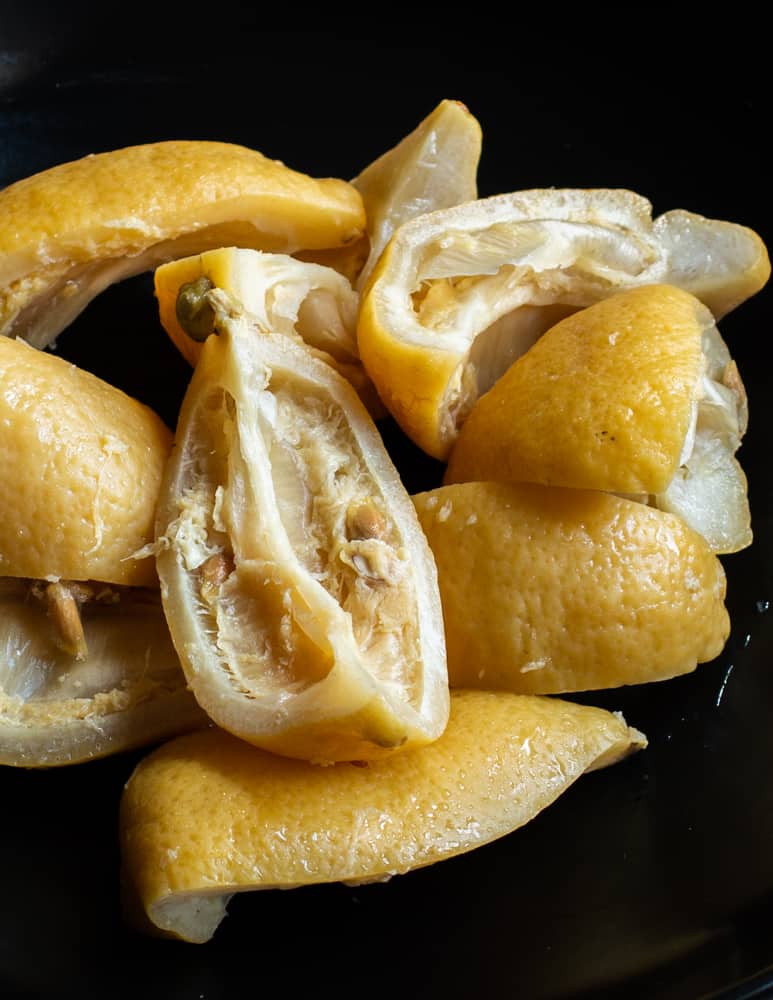
I seem to crave Moroccan-style salted lemons when I don’t have any around. They can be hard to find if you don’t live in a big urban area with access to Middle Eastern markets.
Making your own, while a fun experiment, takes months. But there's an easier way to do it. Instead of just burying lemons in salt you can ferment them, and it's my favorite preserved lemons recipe.

Why it works
They're pretty darn close to traditional salted or preserved lemons (which are not fermented). But, these come without extra salt you have to rinse or soak off, and you won't be left with a bunch of salt at the bottom of the jar.
It’s also done in a couple weeks, instead of months, and, just like salted lemons, it’s also shelf stable near indefinitely. They make a delicious addition to savory dishes, and have the bonus of the beneficial bacteria from the fermentation process.
Depending on the fermentation process you use to make them, fermented lemons can also give you fermented lemon juice some people value for it's "health benefits". The liquid isn’t indelibly salty as with traditional preserved lemons that are buried in salt.
There's two different ways you can make these: in brine, and fermented under vacuum. I'll describe each method.
Fermenting in Brine
Lemons will ferment easily in a traditional brine ferment. To do it, take lemons and quarter them, put the lemons in a jar, and pour over a solution of 3% brine.
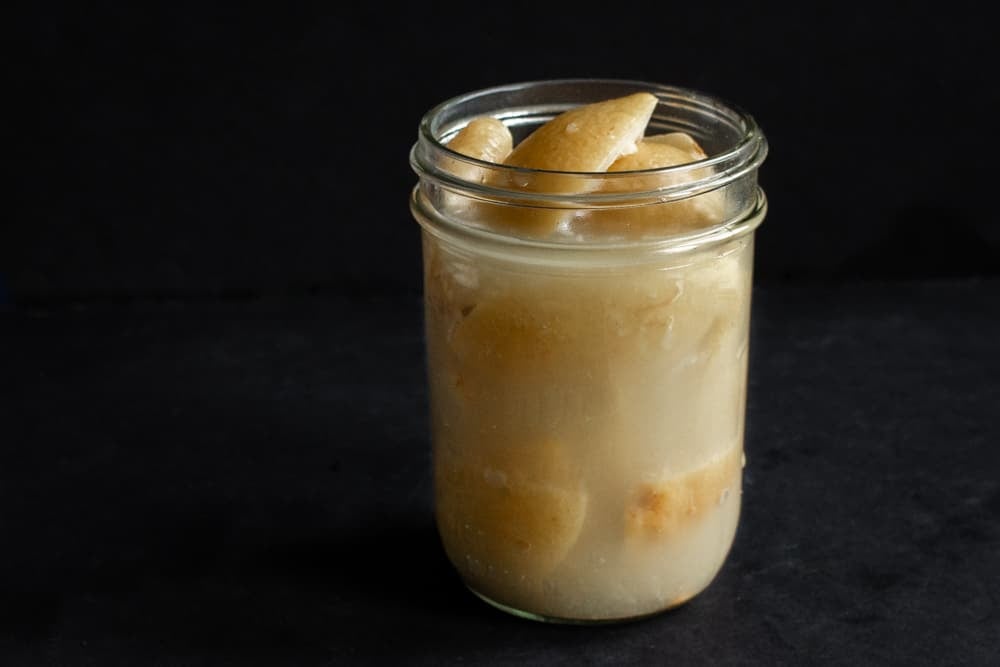
Press the lemons down with something (a clean stone is fine) and allow to ferment for two weeks, or until sour to your liking. You can also use an air lock.
Fermenting only the rind in brine
If you cut the flesh and seeds from the quarters of lemons, you can ferment the rind, saving the fresh lemon juice for another purpose. This also allows more lemon rind to fit into a jar, which will give you a higher yield.
Fermenting Under Vacuum
Fermenting under vacuum is my favorite and a great way to preserve food. Vacuum fermentation means that as the ferment isn’t exposed to air, it’s basically impossible for it to mold. Using vacuum fermentation, I have never seen any sort of mold or kahm yeast develop.
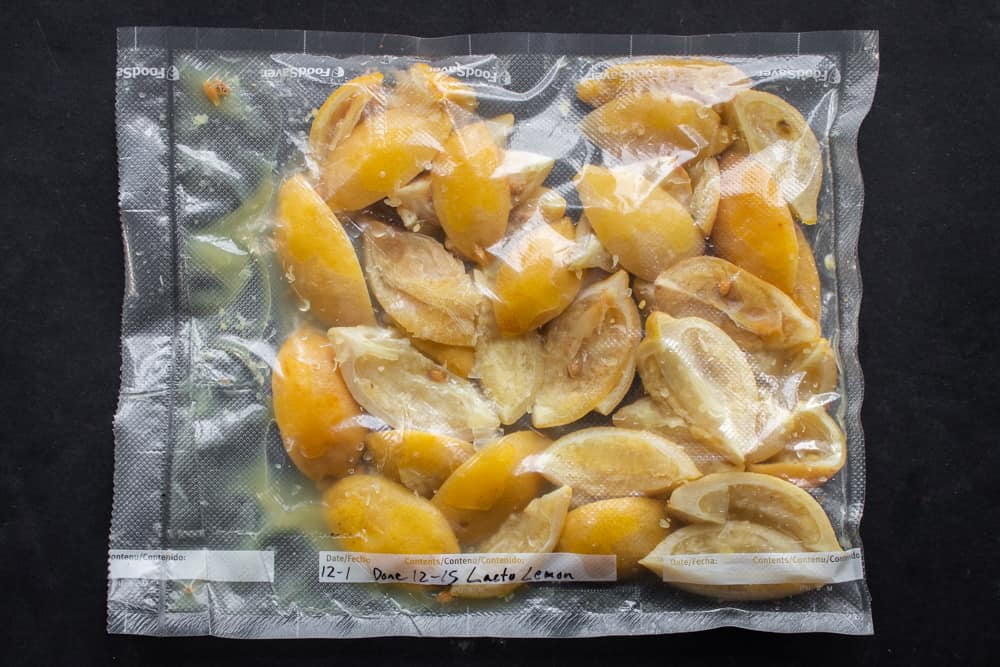
The lack of air exchange in vacuum ferment means that the lemons, along with aroma in the rind are trapped together. This forces a marinating exchange of flavors that happens as the fermentation takes place.
These taste and smell and taste extra lemony. This is because none of the aromas have been lost to air exchange from exposing them to air.
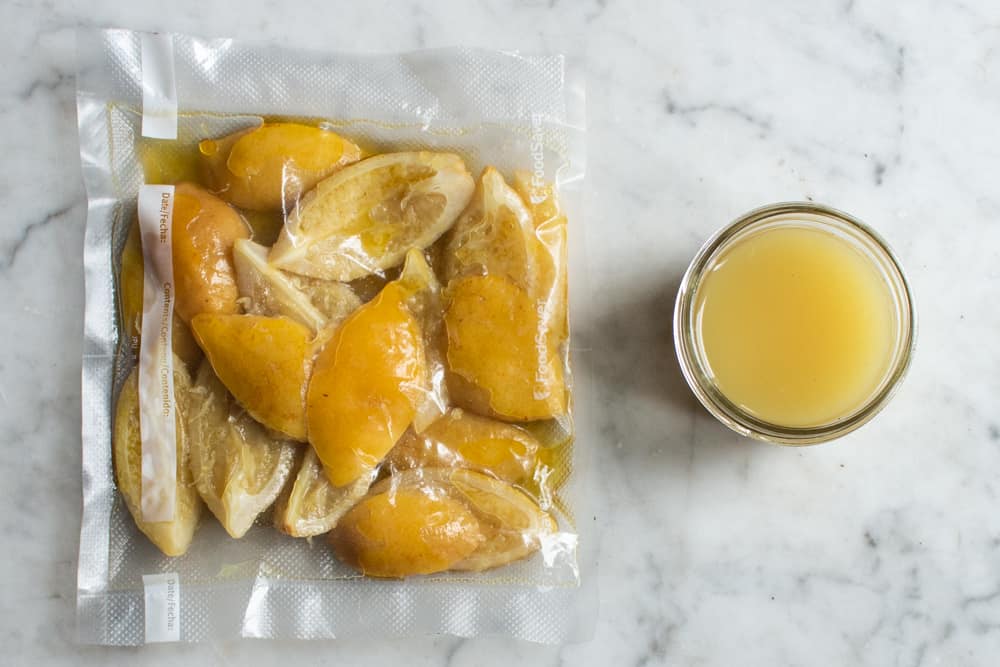
Adjust the texture of the fermented lemon rind
One of my favorite things about traditional salted lemons is their tender bite. Fermented lemons won’t have the same soft chew of salted lemons at first, but it’s easy to get around.
To soften the texture to use as preserved lemons, I sous-vide the fermented lemons or steam them gently until they’re tender. If you’re putting the lemons in a stew like a tagine, you just can simmer it a bit longer until the lemon pieces are tender.
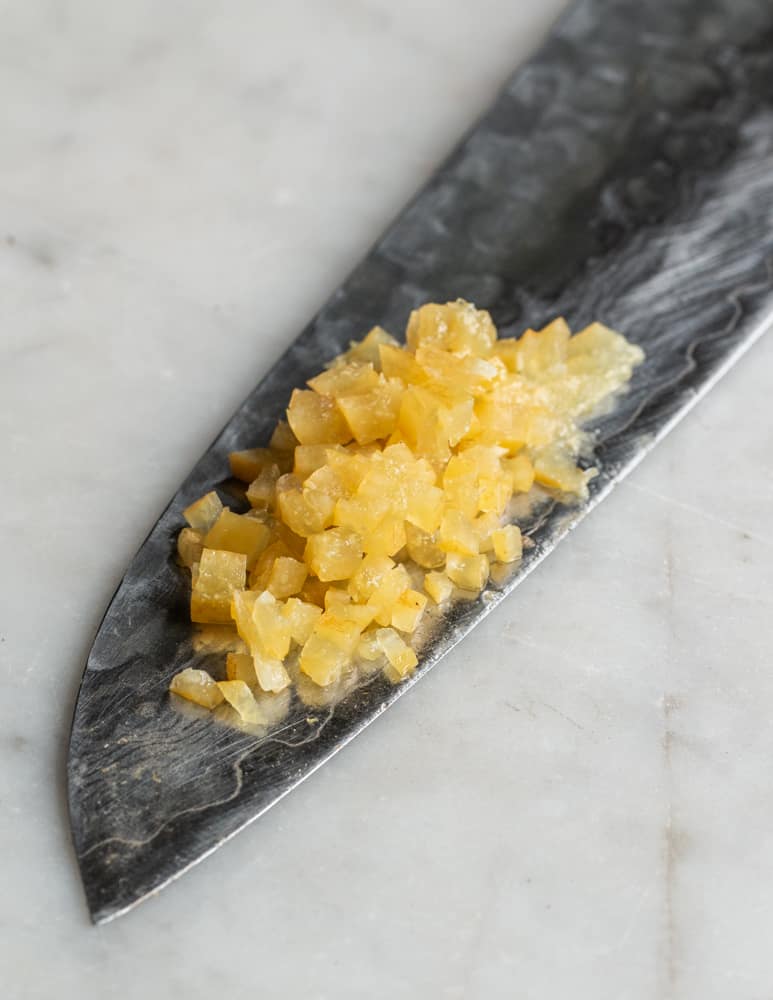
How to Use
You can use fermented lemons in any recipe that would call for preserved lemons.
Tagines
The North African stew is probably the best-known place where you’ll find preserved lemons. Other soups and stews especially complex things like curries can also work.
Dips and spreads
Adding a sprinkle of finely diced, cooked, fermented lemons will add a great lemony bite, artichoke dip is a good example. The chopped rind can also be mixed in things that will be buzzed in a food processor. Borani esfenaj with fermented lemon would be great.
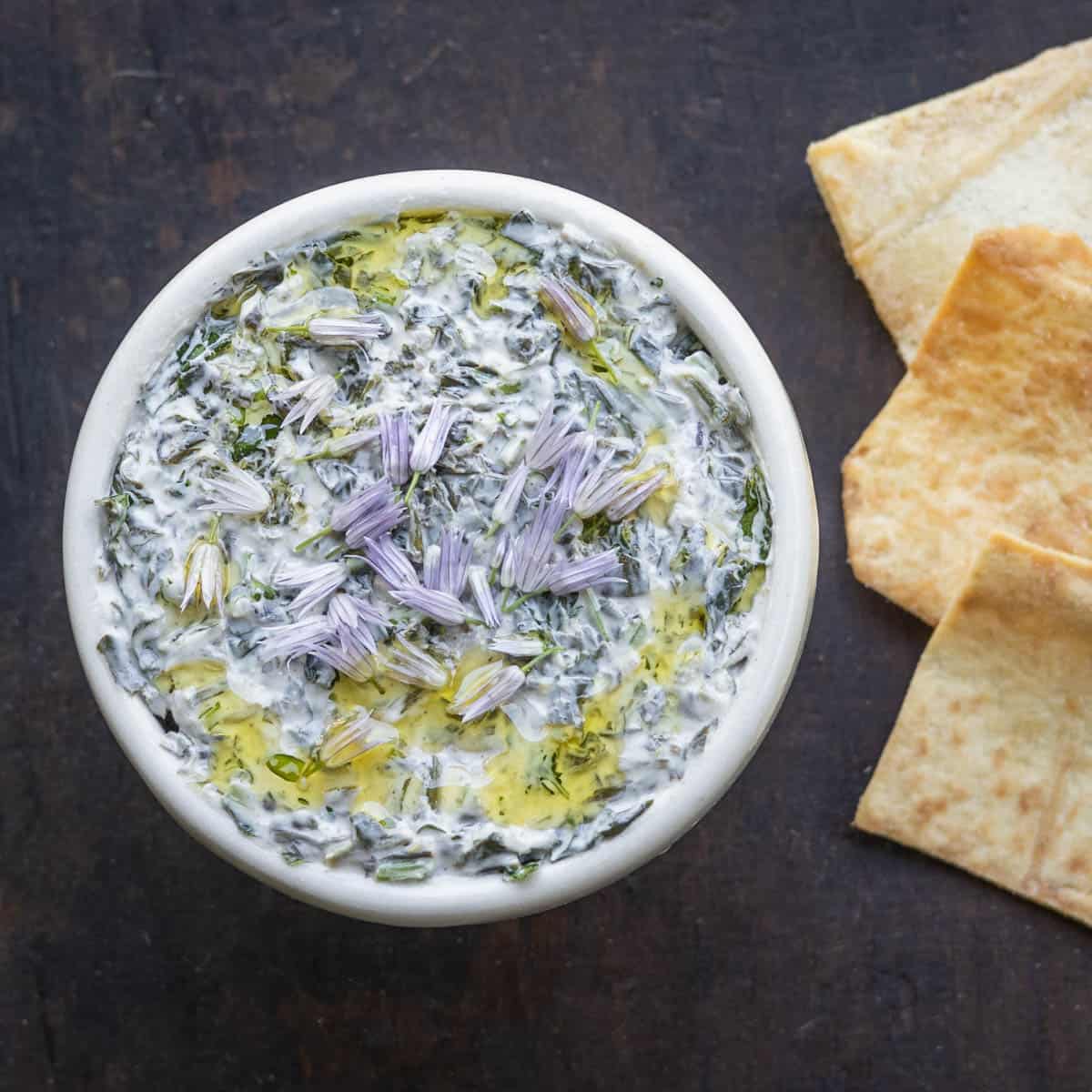
Use where you’d use lemon zest
Pan sauces, stuffings, etc. I worked at one place where we made a compound butter for steak made from blending preserved lemon, rosemary and black pepper in a food processor.
With Leafy Greens
Morrocan Foraged Greens with Preserved Lemon: Bakula or Bqula, is one of the most traditional recipes for purslane / verdolagas I know of. Preserved lemons are added at the end. You can substitute many different cooked leafy greens there.
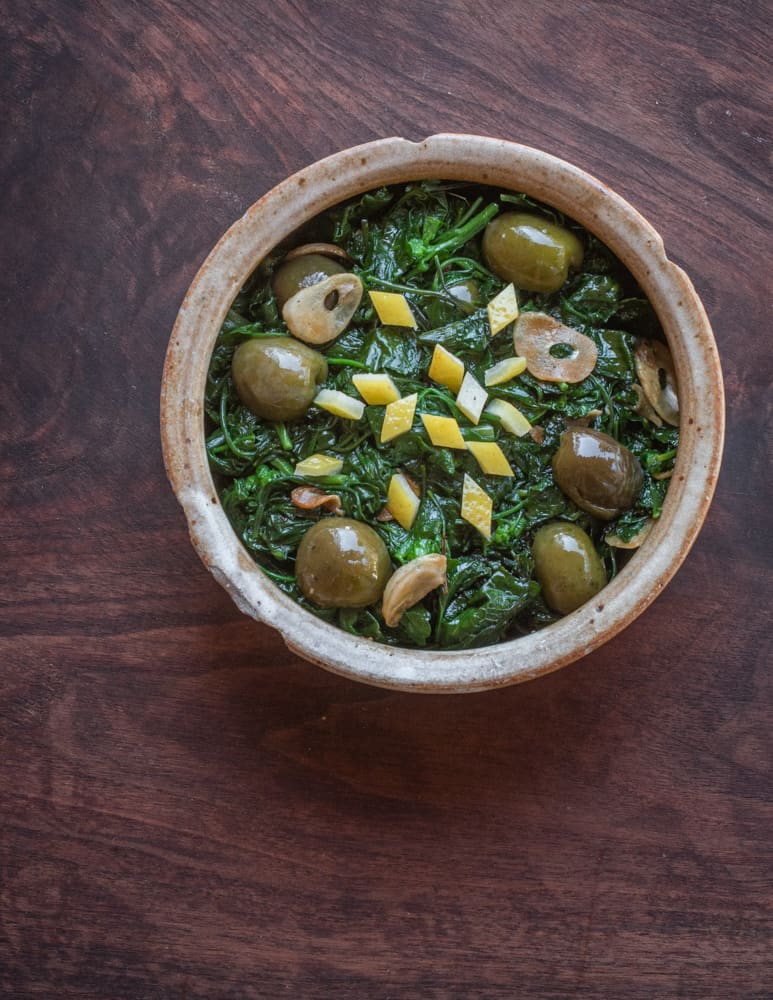
Vacuum Fermented Lemons
Equipment
- Vacuum sealer
- Vacuum bag, gallon size
Ingredients
Brine fermented lemons
- 2 lbs Organic lemons or meyer lemons don't use regular lemons
- 27 Grams Kosher salt or sea salt
Instructions
Sealing and fermenting
- Cut the lemons into quarters the long way, then add salt, mix, and quickly seal in the vacuum bag. Allow the lemons to ferment in the bag for 2 weeks, or until sour to your liking.
- As the fermentation progresses, the bag will inflate from carbon dioxide. While I've never had a bag burst, I do cut the corner off of the bag as needed to release carbon dioxide, resealing the cut corner without using the vacuum to keep the lemons contained.
Trimming
- After the lemons are fermented, remove them from the bag, put them rind-side down on a cutting board, and, using a sharp paring knife, cut away the pith and seeds and discard. If you used the vacuum method, you can squeeze the capillaries and pith to extract fermented lemon juice.
- From here, the lemons are shelf stable and can be held in the refrigerator, or water-bath canned in their brine if you used brine. Canning in brine will also tenderize the rind, which is a nice bonus. Water-bath canning lemons in their juice, can become slightly bitter, but you can cover them with oil in the fridge as well.
Tenderizing the rind
- Finally, you need to heat the rind long enough for it to become tender. My favorite way to do this is to seal in a vacuum bag and cook sous vide at 150 F for 2 hours, but you can also steam them.
Notes
To Ferment Lemons in Brine
-
Make a 3% brine solution by mixing 30 grams of salt for every 1000 grams of water.
-
Cut your lemons into quarters and pack into a large jar, such as a half gallon mason jar, or a couple quart jars.
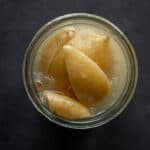

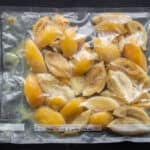
Deanna Berkemeier
Thank you for this. Will you please clarify if I can ferment just the empty remains of lemon rinds after juicing lemons or if there must be intact lemon capillaries attached in order for the ferment to work? Normally I zest the leftover rinds when I have juiced lemons and freeze that zest for baking. This sounds like a delicious option for savory dishes, especially with the ability to ferment them in vacuum bags.
Alan Bergo
Hi Deanna, no the juice isn’t necessary. You’d need to ferment them in brine in a jar, but a with a vacuum bag all you need is salt!
Cecilie
Hi Alan
I’m a bit unsure as to how I store the fermented lemons (after using the vacuum method for fermenting). In the recipe you said not to store them in their juice as it becomes bitter, but as a reply to the most recent comment, you’re saying they can be stored in the brine they make…
I’d like to tenderise them all and them store them somehow 🙂
Alan Bergo
There's a few ways you can do it. One way is to poach the lemon pieces in oil and store them in a jar like that (or vacuum bag). The lemons will be good as long as they're covered by oil and kept in the fridge. I'll add the bitterness won't be too noticeable in finished dishes if you store them in the brine either as they're cut into such small pieces so I'm going to adjust that, thanks for pointing out the discrepancy there.
Cecilie
Thank you!
Right now I have kept them in the vacuum-sealed bag along with the juice, they have released. Could I just sousvide them like this or do you think that would ruin the flavour?
Alan Bergo
Yes I'd just heat them to kill the ferment and refrigerate.
Chris LaVenture
Can you tell me how to access past comments that have been removed from the website? I didn't write down your comments like I should have,
Alan Bergo
Hi Chris. Comments aren’t typically removed.
Bethany Ringdal
I'm excited to try! Any details on how to store the finished product? I use salt-packed preserved lemon a lot, and usually make one big batch during citrus season to use all year. You mention a similar stability on fermented lemon. Deets?
Alan Bergo
Hey Bethany. They're fermented and very stable, but you do want to keep them away from sitting in open air. You can cover them with oil, or you can cover them in the salty lemon brine they make and keep them in the fridge.
Diego
Can I keep them in the brine but in a vacuum bag? Thanks
Alan Bergo
Yes
Amy
I tried it both ways. Used a steamer vac bag and didn’t get a tight compressed seal so they got mold on them, but the fermented in brine are nice (Meyer). Have removed from brine but not sure how to store in fridge? Have drained, put in clean jar, packed in and topped with oil so hope that’s ok! Don’t want them to spoil now!
Love the flavour. Thanks
Alan Bergo
Thanks Amy, I've never seen mold on a vacuum ferment, but yes, it's important to get a tight seal.
Will K.
I frequently make traditional preserved lemons (packed in salt). I wonder, if just fermenting the rinds, whether you could incorporate the juice into the 3% brine used to cover them?
Alan Bergo
I haven't incorporated the juice as I worried about it inhibiting the fermentation but I think it would probably work.
Brad Rhodes
Regarding the vacuum ferment method, could you be a little more specific than salt as needed?
Thanks
Alan Bergo
Most fermenters know the %’s but yes, I meant to put the specific weight, it’s 27 grams. I adjusted it.
Brad Rhodes
You did put 27 grams in the recipe Alan.
It’s so odd, yesterday when I hit the jump to recipe button at the top both recipes said salt as needed. Today the vacuum one clearly says 27 grams and the brined one says 3%..Peculiar but thanks for your reply.
VELMA STERENBERG
Thank you!! Use lemon rind in many many dishes & the vacuum process much easier for me . But best of all, it led me to your recipe for Fermented Fungi which, like others who commented, I vowed never to try again after an unsuccessful effort w Suillus grevillie.
Re: the lemons, think this would also work well with Bhudda's Hand. I infuse that fruit in Vodka, but might have to try salting a bit when I'm doing the lemons.
Mary Meyer
I think that you could do better in writing a recipe. A) don't combine one recipe with another; B) try following your recipe exactly as you have written it before publishing. Otherwise, your idea's sound interesting.
Alan Bergo
I’ve made it both ways, and both ways work fine, that’s why there’s images detailing both processes. I wouldn’t put it up if I hadn’t made it exactly as it’s written.
Keith Langdon
I have done lemons in jars before. This year I did my hot sauces in vac pack. I just spun a couple in the blender last week and was very pleased with the result. No kahm yeast and no funk. I am hitting the store tomorrow for some lemons!
E B
So grateful to have this to expand my fermenting skills. I’m getting lovely organic Meyer lemons in my Misfits Market Box so have the goods to try this. I love using lemons in my cooking & Meyer lemons especially are a great treat for me in KS.
Thanks Alan
Alan Bergo
Meyer lemons are the best here, for sure. They're in season now which is partly why I put this up now.